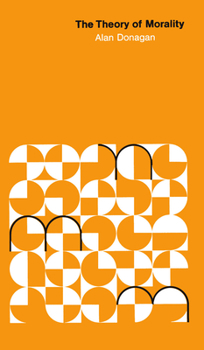The Theory of Morality
Select Format
Select Condition 
Book Overview
"Let us . . . nominate this the most important theoretical work on ethical or moral theory since John Rawls's Theory of Justice. If you have philosophical inclinations and want a good workout, this conscientious scrutiny of moral assumptions and expressions will be most rewarding. Donagan explores ways of acting in the Hebrew-Christian context, examines them in the light of natural law and rational theories, and proposes that formal patterns for conduct can emerge. All this is tightly reasoned, the argument is packed, but the language is clear."-Christian Century "The man value of this book seems to me to be that it shows the force of the Hebrew-Christian moral tradition in the hands of a creative philosopher. Throughout the book, one cannot but feel that a serious philosopher is trying to come to terms with his religious-moral background and to defend it against the prevailing secular utilitarian position which seems to dominate academic philosophy."-Bernard Gert, Journal of Medicine and Philosophy
Format:Paperback
Language:English
ISBN:0226155676
ISBN13:9780226155678
Release Date:September 1979
Publisher:University of Chicago Press
Length:294 Pages
Weight:0.98 lbs.
Dimensions:0.6" x 5.4" x 8.5"
Customer Reviews
2 ratings
Simply the best
Published by Thriftbooks.com User , 18 years ago
If you are a Kantian, as I am, you will love this book. It is the best statement of that kind of ethical philosophy since Kant's own of which I am aware. Donagan not only points out the fatal flaw of utilitarianism (which is blithely ignored by most utilitarians), namely, that it requires knowledge that cannot be had; he also persuasively defends Kantianism against the supposedly equally fatal charge of requiring actions that are insane (as in the expression "Let justice prevail even though the sky may fall"). To be perfect, all this book needs is a better index.
Putting Ethics Back on Its Feet
Published by Thriftbooks.com User , 22 years ago
The basic purpose of Alan Donagan's "A Theory of Morality" is to overturn the "meta-ethical" perspective of twentieth-century philosophy of ethics and to re-create ethics as a substantive discipline. There are two basic questions in ethical philosophy. First, what are the contents of morality. Second, why should (or shouldn't) we bother to adhere to the precepts of morality. Logically, the first question would seem to be prior to the second: after all, how can you decide whether or why to be moral until you have some reasonably clear idea as to what being moral actually consists of? It would be as if one were converting to Islam (or Hinduism or Mormonism or whatever) before bothering to ascertain what Islam, Mormonism, or Hinduism actually consisted of. Yet, twentieth-century philosophers curiously inverted the order of the two basic questions. Most of twentieth-century ethical philosophy consisted of trying to invent reasons why people should be moral before having made clear what constituted "being moral." Even honest attempts to found substantive theories of morality did not start with the contents of morality but rather with trying to uncover motives that might be sufficient to motivate people to behave morally. Once such motives were identified, a moral system was constructed that might manage to appease these motives. For example, Tara Smith begins her recent book, "Viable Values," by declaring, "My immediate concern is not so much with how to be moral as it is with why one should be moral...The source of moral authority is logically prior to the contents of moral prescriptions..."The moral cart was thereby pulling the moral horse. Alan Donagan's goal in this brilliant but largely neglected masterpiece was to put the horse back where it belonged. Donagan's central insight is that, while we may differ wildly on meta-ethical issues such as the metaphysical foundations of morality, the ontological standing of moral utterances, etc., we nonetheless pretty much all have an understanding of the basic down-to-earth precepts of morality: thou shalt not steal, thou shalt not murder, thou shalt not lie, etc. There may of course be difficult cases and gray areas (how to treat a fetus, how to deal with the terminally ill, etc.), but if you were to announce that you have created an "alternate morality" which demands incessant lying, stealing, murdering, etc., you would not really be offering to change morality but would merely be announcing your intent to abandon morality. In short, you would not have engaged in a philosophical innovation but merely have revealed your own lack of moral character. Donagan calls this generally understood moral core "common morality." He takes this, largely undisputed, moral core and from it inductively generalizes to the principle underlying common morality. Donagan argues, convincingly, that the underlying concept of common morality can be expressed quite simply: "Act always so that you respect every h





